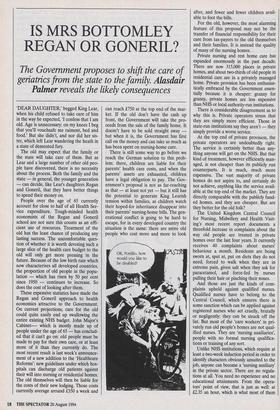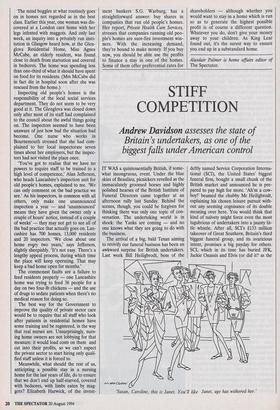IS MRS BOTTOMLEY REGAN OR GONERIL?
The Government proposes to shift the care of
geriatrics from the state to the family. Alasdair Palmer reveals the likely consequences `DEAR DAUGHTER,' begged King Lear, when his child refused to take care of him in the way he expected, 'I confess that I am old. Age is unnecessary: on my knees I beg that you'll vouchsafe me raiment, bed and food.' But she didn't, and nor did her sis- ter, which left Lear wandering the heath in a state of demented fury.
The old may expect that the family or the state will take care of them. But as Lear and a large number of other old peo- ple have discovered, there is no necessity about the process. Both the family and the state — in general, the younger generation — can decide, like Lear's daughters Regan and Goneril, that they have better things to spend their money on.
People over the age of 65 currently account for close to half of all Health Ser- vice expenditure. Tough-minded health economists of the Regan and Goneril school are not sure this counts as an effi- cient use of resources. Treatment of the old has the least chance of producing any lasting success. The uncomfortable ques- tion of whether it is worth devoting such a large slice of the health care budget to the old will only get more pressing in the future. Because of the low birth rate which now characterises all developed countries, the proportion of old people in the popu- lation — which has risen by 50 per cent since 1950 — continues to increase. So does the cost of looking after them.
These expensive statistics have made the Regan and Goneril approach to health economics attractive to the Government. On current projections, care for the old could quite easily end up swallowing the entire existing NHS budget. John Major's Cabinet— which is mostly made up of people under the age of 65 — has conclud- ed that it can't go on: old people must be made to pay for their own care, or at least more of it than they currently do. The most recent result is last week's announce- ment of a new addition to the 'Healthcare Reforms': new guidelines under which hos- pitals can discharge old patients against their will into nursing or residential homes. The old themselves will then be liable for the costs of their new lodging. Those costs currently average around £350 a week and can reach £750 at the top end of the mar- ket. If the old don't have the cash up front, the Government will take the pro- ceeds from the sale of the family home. It doesn't have to be sold straight away but when it is, the Government has first call on the money and can take as much as has been spent on nursing-home care.
There is still some way to go before we reach the German solution to this prob- lem: there, children are liable for their parents' health care costs, and when the parents' assets are exhausted, children have a legal obligation to pay. The Gov- ernment's proposal is not as far-reaching as that — at least not yet — but it still has the potential to generate King Learish tension within families, as children watch their hoped-for inheritance disappear into their parents' nursing-home bills. The gen- erational conflict is going to be hard to escape, for in every developed country the situation is the same: there are more old people who cost more and more to look after, and fewer and fewer children avail- able to foot the bills.
For the old, however, the most alarming feature of this proposal may not be the transfer of financial responsibility for their care from tax-payers to the old themselves and their families. It is instead the quality of many of the nursing homes.
Private nursing and rest home care has expanded enormously in the past decade. There are now 315,000 places in private homes, and about two-thirds of old people in residential care are in a privately managed home. Private provision has been enthusias- tically embraced by the Government essen- tially because it is cheaper: granny for granny, private homes are less expensive than NHS or local authority-run institutions.
There is considerable disagreement as to why this is. Private operators stress that they are simply more efficient. Those in state-run institutions say they aren't — they simply provide a worse service.
At the top end of private provision, the private operators are undoubtedly right. The service is certainly better than any- thing anyone will get on the NHS. But that kind of treatment, however efficiently man- aged, is not cheaper than its publicly run counterparts. It is much, much more expensive. The vast majority of private homes do not aspire to, and certainly do not achieve, anything like the service avail- able at the top end of the market. They are directly comparable with the publicly fund- ed homes, and they are cheaper. But are they better for the old folk?
The United Kingdom Central Council for Nursing, Midwifery and Health Visit- ing's most recent report documents a threefold increase in complaints about the way old people are treated in private homes over the last four years. It currently receives 40 complaints about nurses' behaviour a month. Residents are being sworn at, spat at, put on diets they do not need, forced to walk when they are in extreme pain, given salt when they ask for paracetamol, and force-fed by nurses pulling their hair or pinching their noses.
And those are just the kinds of com- plaints upheld against qualified nurses. Qualified nurses have to belong to the Central Council, which ensures there is some sanction which can be applied against registered nurses who act cruelly, brutally or negligently: they can be struck off the list. But most of the 'care workers' in pri- vately run old people's homes are not qual- ified nurses. They are 'nursing auxiliaries', people with no formal nursing qualifica- tions or training of any sort.
Unlike NHS institutions, which require at least a two-week induction period in order to identify characters obviously unsuited to the job, anyone can become a 'nursing auxiliary' in the private sector. There are no regula- tions at all. You need no experience and no educational attainments. From the opera- tors' point of view, that is just as well: at £2.35 an hour, which is what most of them pay auxiliaries, it is difficult to see how any- one capable of doing anything else would be attracted to the job.
Ian Thomas, a man who works in private homes as a nursing auxiliary in Poole and Bournemouth — Devon's famous, or noto- rious, 'Costa Geriatrica' — describes the typical auxiliary as 'young, callous and stupid. Frequently, they are school-leavers who can't get a better job, so they end up cleaning up old people.' After visiting a number of the homes Mr Thomas has worked in, I agree with him. Though they were dressed in nurses' uniforms to make you think they are fully qualified, the auxil- iaries I met were certainly not trained in anything. 'Oh no!' one named Lucy giggled in response to my asking if she was a nurse. 'I've only just left school!'
Dressing auxiliaries as nurses is certainly effective in persuading outsiders of the competence of the staff at a nursing home. 'As you can imagine, it works like a treat on the relatives,' Thomas told me. 'They come to see granny, or to think about plac- ing her, and everywhere they look they see what look like senior nurses. It impresses them no end. I don't remember a single one asking if any of the girls in uniform were actually entitled to wear it.'
Untrained auxiliaries like Lucy are also allowed to dispense drugs to the old peo- ple — something which would be a punish- able offence if it happened in an NHS hospital. A 50-bed home is supposed to have at least two staff who are qualified nurses. Thomas says that in his experience most of them do. The problems occur in the frequent periods during which they are absent and the inhabitants of the home are left to the tender mercies of six or so auxil- iaries. They hand on bad practices to each other. If an auxiliary is caught, and fired, for particularly blatant maltreatment of a patient,_he or she can simply move on to the next old people's home. There's no register of nursing auxiliaries. There's no record that anyone can check against. You need two character references, that's all. `I've worked alongside all sorts,' Thomas remarked to me,. 'including people with convictions for violence.' He knows of aux- iliaries who have worked in 12 different homes — leaving under a cloud each time — before finally finding it impossible to get another job.
It is not surprising, then, that old people can be appallingly treated by the 'nurses' who are supposed to be caring for them. In June, for instance, Rachel Blitz was placed in a bath full of scalding water by two auxil- iaries working at Sydney House in Whitechapel, London. She died of her burns two weeks later. The auxiliaries had failed to test the water temperature before hoisting the 90-year-old woman into it. The oversight doesn't seem to have been malicious. It was probably just the result of a complete lack of training of the auxiliaries concerned. And it happened in a home that had been hailed as a model of good practice. The mind boggles at what routinely goes on in homes not regarded as in the best class. Earlier this year, one woman was dis- covered at a London care home with her legs infested with maggots. And only last week, an inquiry into a privately run insti- tution in Glasgow heard how, at the Glen- glova Residential Home, Miss Agnes McCabe, an elderly resident, was found close to death from starvation and covered in bedsores. The home was spending less than one-third of what it should have spent on food for its residents. (Mrs McCabe did in fact die in hospital soon after she was rescued from the home.) Inspecting old people's homes is the responsibility of the local social services department. They do not seem to be very good at it. The Glenglova was closed down only after most of its staff had complained to the council about the awful things going on. The inspectors seemed to have been unaware of just how bad the situation had become. One nurse who works in Bournemouth stressed that she had com- plained to her local inspectorate seven times about her employers, but the inspec- tors had not visited the place once.
`You've got to realise that we have no powers to require staff to be trained to a high level of competence,' Alan Jefferson, who heads Lancashire's inspection unit for old people's homes, explained to me. 'We can only comment on the bad practice we see.' As his inspectors, in common with all others, only make one unannounced inspection a year — and 'unannounced' means they have given the owner only a couple of hours' notice, instead of a couple of weeks' — they may not get to see all of the bad practice that actually goes on. Lan- cashire has 700 homes, 13,000 residents and 20 inspectors. 'We close about one home ev9ry two years,' says Jefferson, slightly sheepishly. 'It's not easy. There's a lengthy appeal process, during which time the place will keep operating. That may keep a bad home open for months.'
The commonest faults are a failure to feed residents properly — one Lancashire home was trying to feed 36 people for a day on two four-lb chickens — and the use of drugs to sedate patients when there's no medical reason for doing so.
The best way for the Government to improve the quality of private sector care would be to require that all staff who look after patients in residential homes have some training and be registered, in the way that real nurses are. Unsurprisingly, nurs- ing home owners are not lobbying for that measure: it would load costs on them and cut into their profits, so we can't expect the private sector to start hiring only quali- fied staff unless it is forced to.
Meanwhile, what should the rest of us, anticipting a possible stay in a nursing home for the last years of life, do to ensure that we don't end up half-starved, covered with bedsores, with limbs eaten by mag- gots? Elizabeth Harwick, of the invest- ment bankers S.G. Warburg, has a straightforward answer: buy shares in companies that run old people's homes. Her report, Private Health Care Services, stresses that companies running old peo- ple's homes are sure-fire investment win- ners. With the increasing demand, they're bound to make money. If you buy now, you should be able use the profits to finance a stay in one of the homes. Some of them offer preferential rates for shareholders — although whether you would want to stay in a home which is run so as to generate the highest possible profit is of course a different question. Whatever you do, don't give your money away to your children. As King Lear found out, it's the surest way to ensure you end up in a substandard home.
Alasdair Palmer is home affairs editor of The Spectator.




















































 Previous page
Previous page